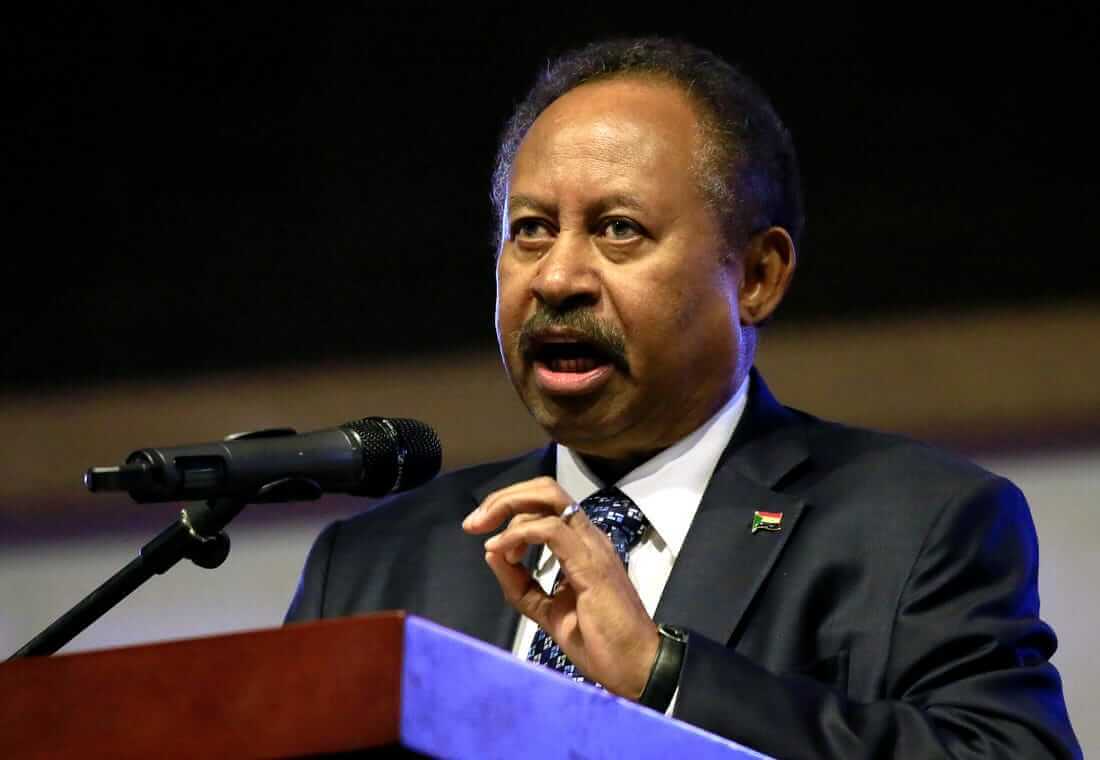Sudanese Prime Minister Abdalla Hamdok said at the Financial Times Africa Summit that the normalization of ties with Israel must not be used as a bargaining chip by the US to remove Sudan from the superpower’s list of state sponsors of terrorism (SST).
Thus far, the Trump administration has said that Sudan’s removal from its terror list is dependent on Khartoum normalizing relations with Jerusalem. Sudan was added to the SST list in 1993 during former President Omar al-Bashir’s administration, due to the government’s ties with Islamic extremists, such as the Abu Nidal Organization, the Palestinian HAMAS, the Palestinian Islamic Jihad, the Lebanese Hizballah, and Egypt’s al Gama’at al-Islamiyya. Moreover, al-Qaeda’s Osama bin Laden took refuge in Sudan from 1991 to 1996.
At the Summit, Hamdok said, “In terms of the delisting and the normalization with Israel, we said very clearly to our American friends that we need to separate the two tracks for Sudan to be removed from the SST list…As far as normalization is concerned we said this is a separate track. We like to believe normalization is not an event, it’s a process. We’d need to embark on it in a process that will take its own course, so we’d really like to see these two tracks separated and addressed separately.”
Sudan is desperate to be removed from the SST, as the financial impacts of its economic isolation, droughts, and the ongoing coronavirus pandemic have resulted in a severely dour economic outlook. The IMF foresees a 7.2% contraction of Sudan’s economy. Moreover, its SST designation stands in the way of the country receiving humanitarian assistance from the IMF and the World Bank.
Hamdok touched upon these frustrations during his speech, saying, “I thought these IFIs would have instruments that would allow (them) to operate in an extraordinary situation, where you can go behind or around such sanctions for an institution which we are members in. We are no longer a pariah state in all means and purposes. and we thought that would happen. We are very much disappointed with that, but we are engaging with them.”
The US has already brokered deals to normalize ties between both the United Arab Emirates (UAE) and Bahrain with Israel.
Hamdok, for his part, believes that Sudan has done enough to be removed from the SST, regardless of whether or not it enters into a similar deal with Israel. He said, “Our position in this was very clear from the beginning. We started negotiating with the American administration since we came in September last year. I think I must say we made extremely good progress, we’d like to believe we ticked all the relevant boxes for us to qualify to be removed from the state sponsors of terrorism list. After all, Sudan as a people have never been terrorists, this was the deeds of the former regime that’s been toppled by the people of Sudan themselves.”
Sudan has already agreed to pay $335 million to families of the victims of the 1998 terror attacks and the 2000 bombing of the USS Cole in Yemen. The current administration has also signed a historic peace deal with rebel groups on the topics of land ownership, reparations and compensation, wealth and power-sharing, and the return of refugees and internally displaced people. The deal also paves the way for self-governance in the southern provinces of Blue Nile, South Kordofan, and West Kordofan.
At the same time, the Hamdok administration has instituted a number of progressive reforms, including scrapping the apostasy law, criminalizing female genital mutilation (FGM), and allowing non-Muslims to consume alcohol, among other reforms.
Following a recent meeting between Hamdok and US Secretary of State Mike Pompeo, Sudanese government spokesperson Faisal Saleh clarified that the country’s 39-month transitional period “is being led by a wide alliance with a specific agenda - to complete the transition, achieve peace and stability in the country and hold free elections” and that “it does not have a mandate beyond these tasks or to decide on normalization with Israel”.
Similar to his comments made at the Summit, Hamdok during his meeting with Pompeo also “called on the US administration to separate the process of removing Sudan from the list of states sponsoring terrorism and the issue of normalization with Israel”.
While cooperation with American and international counterterrorism efforts led to the withdrawal of the majority of the US’ sanctions on Sudan in 2017, the country’s removal from the SST remains a sticking point in bilateral ties. It remains to be seen whether Sudan will crumble under the pressure of the Trump administration to normalize ties with Israel.
Sudanese PM Says Normalizing Ties With Israel Must Not Be Linked to Removal From SST List
Prime Minister Abdalla Hamdok decried that the US is making Sudan’s removal from its list of state sponsors of terrorism contingent on normalizing ties with Israel.
October 14, 2020

IMAGE SOURCE: MOHAMED NURELDIN ABDALLAH / REUTERSSudanese Prime Minister Abdalla Hamdok
